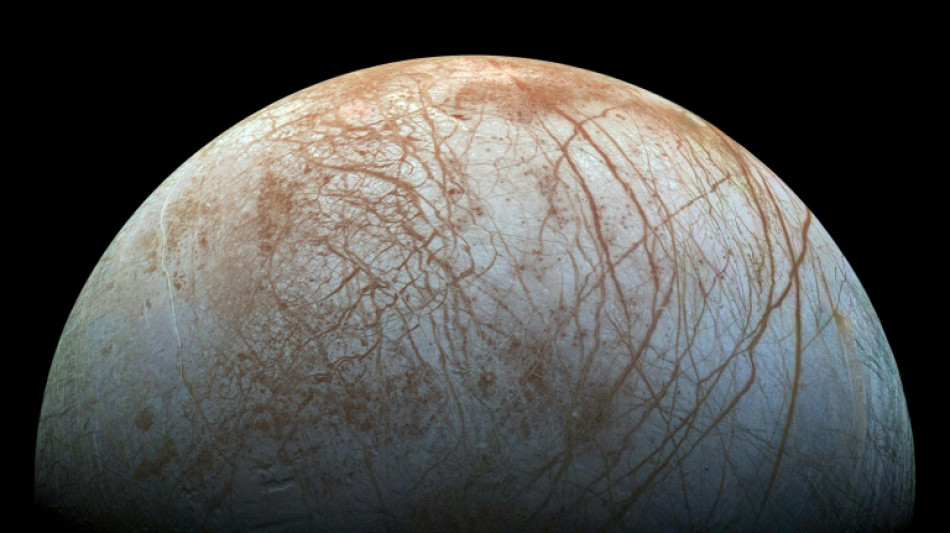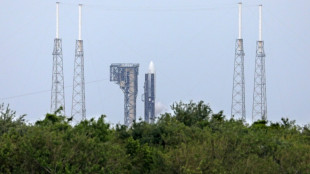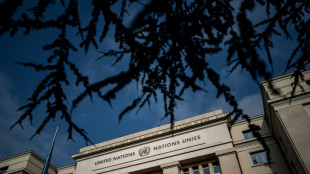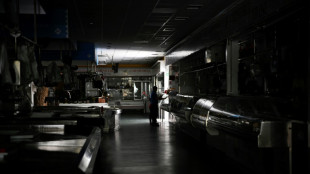
-
 Amazon set for launch of Starlink-rival satellites
Amazon set for launch of Starlink-rival satellites
-
London mayor Sadiq Khan targets Olympic history for city

-
 Stock markets diverge amid trade hopes, ahead of earnings
Stock markets diverge amid trade hopes, ahead of earnings
-
Canada votes as Trump renews US takeover push

-
 Massive blackout hits all of Spain and Portugal
Massive blackout hits all of Spain and Portugal
-
Conclave starts May 7, cardinals say new pope must tackle abuse

-
 BRICS ministers meet in Brazil over Trump trade policies
BRICS ministers meet in Brazil over Trump trade policies
-
Trump escalates immigration crackdown to mark 100 days

-
 Outkast, White Stripes, Cyndi Lauper among Rock Hall inductees
Outkast, White Stripes, Cyndi Lauper among Rock Hall inductees
-
Putin orders three-day truce in May but Ukraine asks 'Why wait?'

-
 Eubank Jr discharged from hospital following boxing grudge match
Eubank Jr discharged from hospital following boxing grudge match
-
China deploys army of fake NGOs at UN to intimidate critics: media probe

-
 Empty shelves? US Treasury secretary not concerned 'at present'
Empty shelves? US Treasury secretary not concerned 'at present'
-
Slot told Liverpool they could win the league at season start: Konate

-
 Spain brought to a halt by huge blackout
Spain brought to a halt by huge blackout
-
Stock markets mostly higher amid trade talk hopes

-
 Conclave starts May 7, with cardinals saying new pope must tackle abuse
Conclave starts May 7, with cardinals saying new pope must tackle abuse
-
Massive blackout hits Spain and Portugal

-
 Ruediger 'must show respect to others' says Germany boss Voeller
Ruediger 'must show respect to others' says Germany boss Voeller
-
As Canada votes, Trump pushes US takeover plan

-
 Ten on trial in Paris over 2016 gunpoint robbery of Kim Kardashian
Ten on trial in Paris over 2016 gunpoint robbery of Kim Kardashian
-
African players in Europe: Salah scores, takes selfies as Reds seal title

-
 Bangladesh spinner Taijul's 5 wickets trigger Zimbabwe collapse in 2nd Test
Bangladesh spinner Taijul's 5 wickets trigger Zimbabwe collapse in 2nd Test
-
French mosque murder suspect, 21, surrenders in Italy

-
 Mayor Khan keen for London to make Olympics history
Mayor Khan keen for London to make Olympics history
-
Iranian president visits Azerbaijan as ties warm

-
 What we know ahead of the conclave
What we know ahead of the conclave
-
Jannik Sinner launches foundation supporting children

-
 Villagers on India's border with Pakistan fear war
Villagers on India's border with Pakistan fear war
-
Putin announces surprise Ukraine truce for May 8-10

-
 Conclave to elect new pope starts May 7
Conclave to elect new pope starts May 7
-
Stock markets mostly rise amid trade talk hopes

-
 India says signs deal with France for 26 Rafale fighter jets
India says signs deal with France for 26 Rafale fighter jets
-
Trump's deep-sea mining order violates global norms: France

-
 India Kashmir crackdown sparks anger as Pakistan tensions escalate
India Kashmir crackdown sparks anger as Pakistan tensions escalate
-
Russia says claims over annexed Ukraine regions key to peace

-
 Austrian climber dies on Nepal mountain
Austrian climber dies on Nepal mountain
-
Fires rage 2 days after Iran port blast killed 46

-
 Palestinian official tells ICJ Israel using aid blockage as 'weapon of war'
Palestinian official tells ICJ Israel using aid blockage as 'weapon of war'
-
France arrests 25 in police raids after prison attacks

-
 Kim Kardashian's next star turn is in a Paris courtroom
Kim Kardashian's next star turn is in a Paris courtroom
-
Syria group says military chief arrested in UAE

-
 Anger in Indian Kashmir at demolitions and detentions
Anger in Indian Kashmir at demolitions and detentions
-
Italy bank merger wave heats up as Mediobanca eyes Banca Generali

-
 Putin critic Johann Wadephul, Germany's incoming foreign minister
Putin critic Johann Wadephul, Germany's incoming foreign minister
-
Cardinals expected to pick conclave date to elect new pope

-
 French mosque murder suspect arrested in Italy
French mosque murder suspect arrested in Italy
-
China says on 'right side of history' in trade standoff with US

-
 Stock markets mostly rise as investors eye trade talks
Stock markets mostly rise as investors eye trade talks
-
Fires rage 2 days after Iran port blast killed 40

| RBGPF | -4.22% | 60.88 | $ | |
| RYCEF | 0.29% | 10.18 | $ | |
| SCS | -1.18% | 9.775 | $ | |
| BTI | 0.51% | 42.265 | $ | |
| RIO | 0.02% | 60.57 | $ | |
| NGG | 0.35% | 72.295 | $ | |
| GSK | 1.49% | 37.995 | $ | |
| BP | -0.05% | 29.175 | $ | |
| CMSC | 0.04% | 22.34 | $ | |
| CMSD | -0.31% | 22.39 | $ | |
| BCC | -0.6% | 94.945 | $ | |
| BCE | 0.87% | 21.84 | $ | |
| RELX | -0.94% | 53.05 | $ | |
| JRI | -0.35% | 12.696 | $ | |
| AZN | 0.89% | 70.195 | $ | |
| VOD | 2.04% | 9.545 | $ |

Is life possible on a Jupiter moon? NASA goes to investigate
Is there anywhere else in our solar system that could support life? An imposing NASA probe is due to lift off on Monday on a five-and-a-half-year journey to Europa, one of Jupiter's many moons, to take the first detailed step toward finding out.
The Europa Clipper mission will allow the US space agency to uncover new details about the moon, which scientists believe could hold an ocean of liquid water beneath its icy surface.
Liftoff is scheduled for "no earlier than" Monday, October 14, from Cape Canaveral in Florida aboard a powerful SpaceX Falcon Heavy rocket, NASA said in a statement.
"Europa is one of the most promising places to look for life beyond Earth," said NASA official Gina DiBraccio at a news conference last month.
The mission will not look directly for signs of life but will instead look to answer the question: Does Europa contain the ingredients that would allow life to be present?
If it does, another mission would then have to make the journey to try and detect it.
"It's a chance for us to explore not a world that might have been habitable billions of years ago," like Mars, Europa Clipper program scientist Curt Niebur told reporters last month, "but a world that might be habitable today, right now."
The probe is the largest ever designed by NASA for interplanetary exploration.
It is 30 meters wide when its immense solar panels -- designed to capture the weak light that reaches Jupiter -- are fully extended.
- Primitive life? -
While Europa's existence has been known since 1610, the first close-up images were taken by the Voyager probes in 1979, which revealed mysterious reddish lines crisscrossing its surface.
The next probe to reach Jupiter's icy moon was NASA's Galileo probe in the 1990s, which found it was highly likely that the moon was home to an ocean.
This time, the Europa Clipper probe will carry a host of sophisticated instruments, including cameras, a spectrograph, radar, and a magnetometer to measure its magnetic forces.
The mission will look to determine the structure and composition of Europa's icy surface, its depth, and even the salinity of its ocean, as well as the way the two interact -- to find out, for example, if water rises to the surface in places.
The aim is to understand whether the three ingredients necessary for life are present: water, energy and certain chemical compounds.
If these conditions exist on Europa, life could be found in the ocean in the form of primitive bacteria, explained Bonnie Buratti, the mission's deputy project scientist.
But the bacteria would likely be too deep for the Europa Clipper to see.
And what if Europa isn't habitable after all? "That also opens up a whole wealth of questions: Why did we think this? And why is it not there?" said Nikki Fox, an associate administrator at NASA.
- 49 flybys -
The probe will cover 2.9 billion kilometers (1.8 billion miles) during its journey to Jupiter, with arrival expected in April 2030.
The main mission will last another four years.
The probe will make 49 close flybys over Europa, coming as close as 25 kilometers (16 miles) above the surface.
It will be subjected to intense radiation -- the equivalent of several million chest x-rays on each pass.
Some 4,000 people have been working on the $5.2 billion mission for around a decade.
NASA says the investment is justified by the importance of the data that will be collected.
If our solar system turns out to be home to two habitable worlds (Europa and Earth), "think of what that means when you extend that result to the billions and billions of other solar systems in this galaxy," said Niebur, the Europa Clipper program scientist.
"Setting aside the 'Is there life?' question on Europa, just the habitability question in and of itself opens up a huge new paradigm for searching for life in the galaxy," he added.
The Europa Clipper will operate at the same time as the European Space Agency's (ESA) Juice probe, which will study two other moons of Jupiter -- Ganymede and Callisto.
C.Garcia--AMWN


